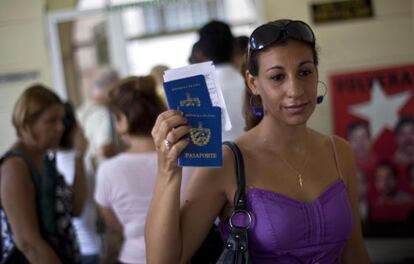Cuba to ease travel restrictions for citizens next year
New decree also abolishes requirement for travelers to obtain so-called letter of invitation

After years of expectations and hope, Cubans woke up to the news Tuesday that, beginning next year, the government will allow them to travel abroad without having to acquire an exit visa.
The amendment to the 1976 Immigration Act was published in the official gazette as a decree that, among other changes, eliminates the exit permits popularly known as the "white card." The changes will go into effect on January 14, according to the official newspaper Granma.
Since the news broke, it has been a major topic of conversation on the streets and in internet forums.
As reported in Granma, this decision is "part of the work undertaken to update the current migration policy adjusting it to prevailing conditions in the present and the foreseeable future." Nevertheless, the article goes on to state "those measures aimed at preserving the human capital created by the Revolution from the theft of talents practiced by the powerful nations shall remain in force." In other words, certain professionals, almost certainly including those in the public health sector, will continue to require special permission to leave the country.
The changes significantly reduce the costs for immigration procedures
For many years, the Cuban government has pinned as traitors those Cubans who sought to leave the country. The relaxations in the new decree also include abolishing the requirement for travelers to also obtain the so-called letter of invitation from the country of destination.
It also extends the time a Cuban resident can remain abroad to 24 months, and nullifies a decision by the Foreign Ministry for a traveler to pay a consular fee for each month he or she remains outside the island.
The changes significantly reduce the costs for immigration procedures. Under the old law, Cubans had to pay 150 pesos (about 183 euros) for exit permits, and about 200 pesos for the invitation letter form. The costs were prohibitive for unmarried Cubans, who earn an average salary of about 20 pesos a month. Nevertheless, the cost of applying for a passport has gone up under the new law from 50 pesos to 100 pesos - a fee that many Cubans are still unable to afford.
Still, there are some clauses in the new law that leave the final decision on whether a person can leave the island to the Cuban authorities, who have the final say on who should receive a passport.
Dissidents and other activists have reason to suspect that they will be bound by spurious clauses so that the authorities can keep them from traveling abroad.
Another clause is also aimed at Cuban exiles. Those who will not receive permission to enter the country are those who intend to "organize, promote, conduct or participate in hostile actions against the political, economic and social aspects of the Cuban state," the decree states.
Tu suscripción se está usando en otro dispositivo
¿Quieres añadir otro usuario a tu suscripción?
Si continúas leyendo en este dispositivo, no se podrá leer en el otro.
FlechaTu suscripción se está usando en otro dispositivo y solo puedes acceder a EL PAÍS desde un dispositivo a la vez.
Si quieres compartir tu cuenta, cambia tu suscripción a la modalidad Premium, así podrás añadir otro usuario. Cada uno accederá con su propia cuenta de email, lo que os permitirá personalizar vuestra experiencia en EL PAÍS.
¿Tienes una suscripción de empresa? Accede aquí para contratar más cuentas.
En el caso de no saber quién está usando tu cuenta, te recomendamos cambiar tu contraseña aquí.
Si decides continuar compartiendo tu cuenta, este mensaje se mostrará en tu dispositivo y en el de la otra persona que está usando tu cuenta de forma indefinida, afectando a tu experiencia de lectura. Puedes consultar aquí los términos y condiciones de la suscripción digital.









































